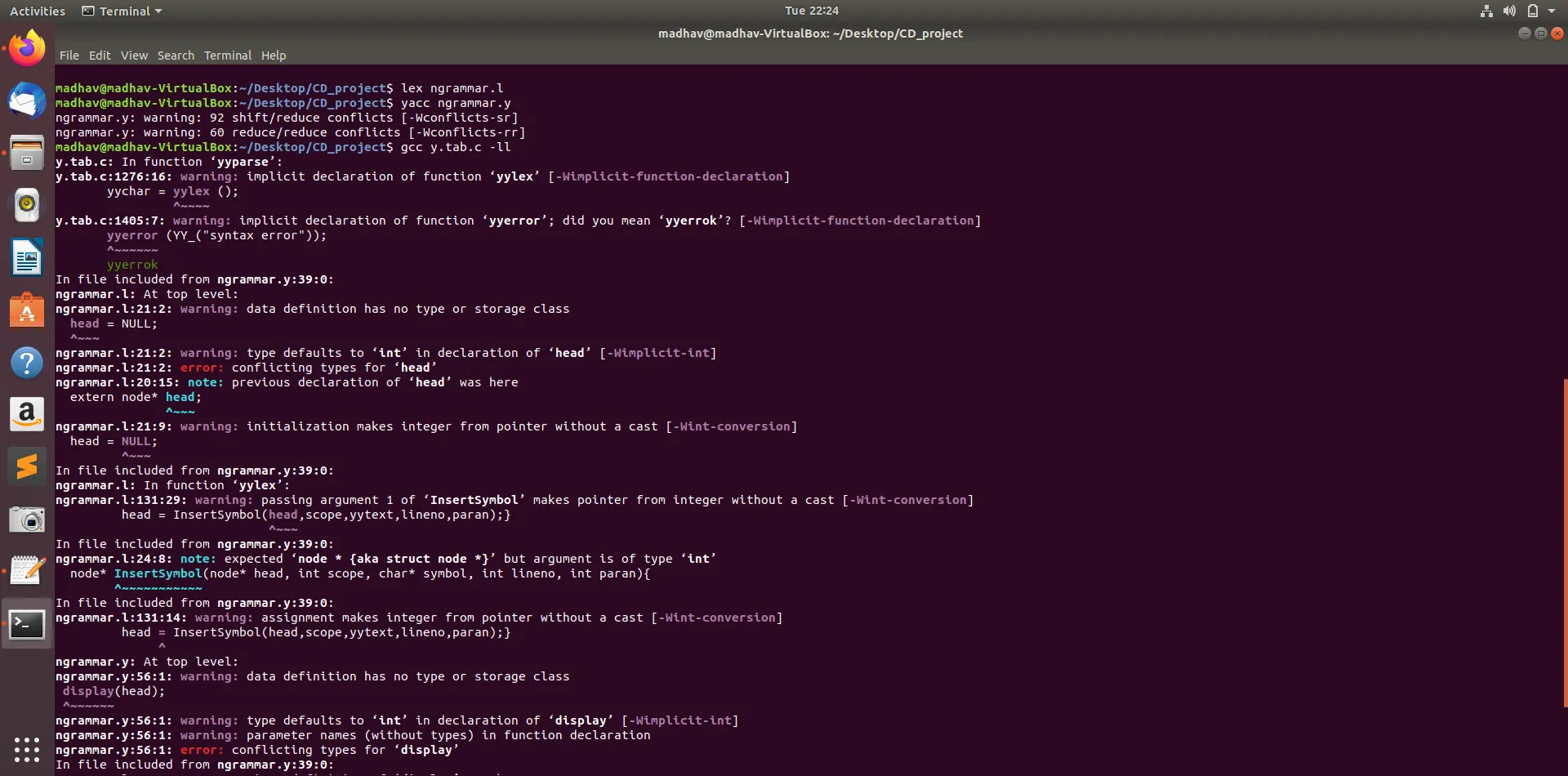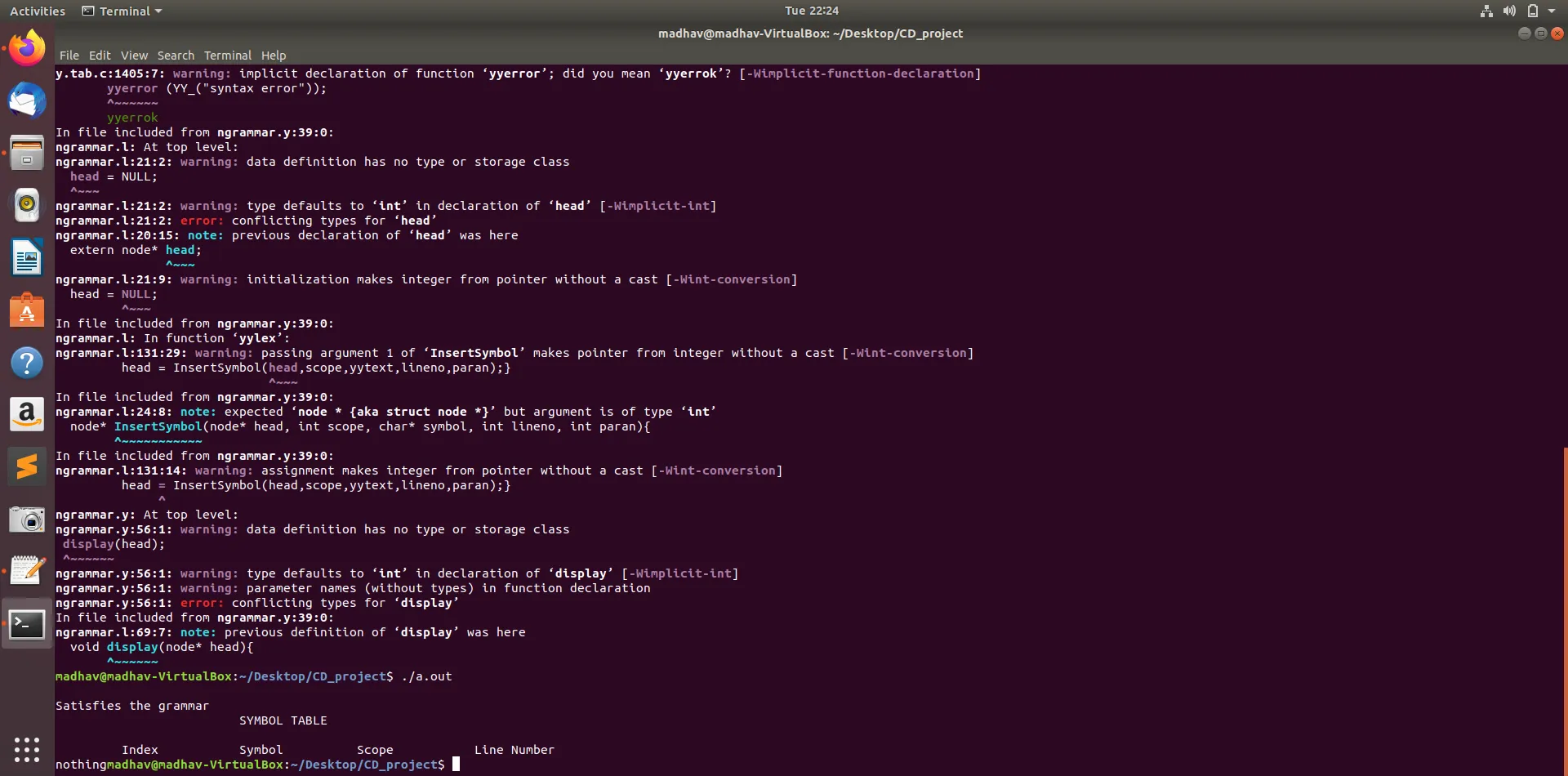我正在尝试使用lex进行词法分析,使用yacc进行语法分析来构建一个简单的C编译器。我在lex中构建符号表,并用所有标识符(仅包括标识符的名称、行号和范围)来填充它,在词法分析中遇到。符号表本身采用链表形式,指针指向链表头。现在,我想能够在yacc中访问这个符号表,以更新每个标识符的值和数据类型。我该如何在yacc中访问符号表?
我已经在lex中将头指针定义为extern,但没有起到作用。以下是完整的参考代码:
Lex(ngrammar.l)-
以下截图显示警告和执行输出:
 (我还没有编写更新值和数据类型的代码。这只是为了在yacc中显示符号表。)
(我还没有编写更新值和数据类型的代码。这只是为了在yacc中显示符号表。)
我已经在lex中将头指针定义为extern,但没有起到作用。以下是完整的参考代码:
Lex(ngrammar.l)-
%{
#include<stdio.h>
#include<string.h>
#include<stdlib.h>
#define MAX 1000
extern int yylval;
int scope = 0;
int lineno = 1;
int paran = 0;
typedef struct node{
int index;
int scope;
char symbol[MAX];
char lineno[MAX];
char type[MAX];
char value[MAX];
struct node* next;
}node;
extern node* head;
head = NULL;
node* InsertSymbol(node*,int,char*,int,int);
void display(node* head);
node* InsertSymbol(node* head, int scope, char* symbol, int lineno, int paran){
if(paran>0){
scope++;
}
else{;
}
if(head == NULL){
node* temp = (node*)malloc(sizeof(node));
temp->index = 1;
temp->scope = scope;
strcpy(temp->symbol,symbol);
char str[4];
sprintf(str, "%d", lineno);
strcpy(temp->lineno,str);
temp->next = NULL;
head = temp;
}
else{
node* cur= head;
node* prev = NULL;
int present = 0;
while(cur != NULL){
if((cur->scope == scope) && (strcmp(cur->symbol,symbol)==0)){
char str[4];
sprintf(str, ", %d", lineno);
strcat(cur->lineno,str);
present = 1;
}
prev = cur;
cur = cur->next;
}
if(present == 0){
node* temp = (node*)malloc(sizeof(node));
temp->index = (prev->index)+1;
temp->scope = scope;
strcpy(temp->symbol,symbol);
char str[4];
sprintf(str, "%d", lineno);
strcpy(temp->lineno,str);
temp->next = NULL;
prev->next = temp;
}
}
return head;
}
void display(node* head){
node* p = head;
printf("\t\t\t SYMBOL TABLE \t\t\t\n\n");
printf("\t Index \t\t Symbol \t Scope \t\t Line Number \n");
if(p == NULL){
printf("nothing");
return;
}
else{
while(p != NULL){
//printf("enter");
printf("\t %d \t\t %s \t\t %d \t\t %s \n",p->index,p->symbol,p->scope,p->lineno);
p = p->next;
}
}
}
%}
alpha [A-Za-z]
digit [0-9]
und [_]
space [ ]
tab [ ]
line [\n]
acc [^"*/"]
str [^\"]
%%
\/\/(.*)[\n]* {;}
\/\*({acc}*\n)*{acc}*\*\/[\n]* {;}
for {return FOR;}
if {return IF;}
char {return CHAR;}
float {return FLOAT;}
int {return INT;}
continue {return CONTINUE;}
return {return RETURN;}
bool {return BOOL;}
main {return MAIN;}
else {return ELSE;}
printf {return PRINT;}
break {return BREAK;}
TRUE {return BOOLTRUE;}
FALSE {return BOOLFALSE;}
\|\| {return OR;}
\%d|\%c|\%f {return FORMATSPEC;}
\( {return OPENBRACES;paran++;}
\) {return CLOSEBRACES;paran--;}
\{ {return OPENCURLYBRACES;scope++;}
\} {return CLOSECURLYBRACES;scope--;}
[.] {return DOT;}
= {return ASSIGNOP;}
\+\+|\-\- {return UNARYOP;}
\+|\-|\*|\/ {return ARITHOP;}
>|<|>=|<=|!=|== {return RELOP;}
&& {return AND;}
[,] {return COMMA;}
[;] {return SEMICOLON;}
['] {return SINGLEQUOTES;}
["] {return DOUBLEQUOTES;}
["]{str}*["] {return STRING;}
{alpha}({alpha}|{digit}|{und})* {return IDENTIFIER;
head = InsertSymbol(head,scope,yytext,lineno,paran);}
{digit}+ {return INTCONST;}
({digit}+)\.({digit}+) {return FLOATCONST;}
[\n] {lineno++;}
[\t] {;}
[ ] {;}
. {return yytext[0];}
%%
int yywrap()
{
return 1;
}
Yacc (ngrammar.y) -
%{
#include<stdio.h>
#include<string.h>
int valid=1;
%}
%token CHAR INT FLOAT BOOL MAIN FOR IF ELSE PRINT BREAK CONTINUE BOOLTRUE BOOLFALSE FORMATSPEC OPENBRACES CLOSEBRACES OPENCURLYBRACES CLOSECURLYBRACES UNARYOP ARITHOP RELOP ASSIGNOP COMMA SEMICOLON SINGLEQUOTES DOUBLEQUOTES UNDERSCORE RETURN AND OR DOT STRING IDENTIFIER INTCONST FLOATCONST
%%
start: INT MAIN OPENBRACES CLOSEBRACES OPENCURLYBRACES statement return_statement CLOSECURLYBRACES;
statement: compound_statement | expression_statement | jump_statement | print_statement | for_loop | if_else;
for_loop: FOR OPENBRACES declaration condition_statement SEMICOLON for_expression_statement CLOSEBRACES statement;
if_else: IF OPENBRACES condition_statement CLOSEBRACES statement ELSE statement;
return_statement: RETURN identifier SEMICOLON | RETURN intconstant SEMICOLON;
declaration: declaration_specifiers init_declarator_list SEMICOLON | init_declarator_list SEMICOLON;
declaration_specifiers: CHAR | INT | FLOAT | BOOL;
init_declarator_list: init_declarator | init_declarator COMMA init_declarator_list;
init_declarator: identifier | identifier ASSIGNOP initializer;
initializer: numconstant | identifier;
compound_statement: OPENCURLYBRACES CLOSECURLYBRACES | OPENCURLYBRACES block_item_list CLOSECURLYBRACES | block_item_list;
block_item_list: block_item block_item | block_item;
block_item: declaration | statement |;
expression_statement: identifier ASSIGNOP expression SEMICOLON | identifier UNARYOP SEMICOLON | UNARYOP identifier SEMICOLON;
expression: identifier ARITHOP identifier | identifier ARITHOP numconstant | numconstant ARITHOP numconstant;
for_expression_statement: identifier ASSIGNOP expression | identifier UNARYOP | UNARYOP identifier;
condition_statement: identifier RELOP identifier | identifier RELOP numconstant | numconstant RELOP identifier | condition_statement AND condition_statement | condition_statement OR condition_statement | BOOLTRUE | BOOLFALSE;
jump_statement: BREAK SEMICOLON | CONTINUE SEMICOLON;
print_statement: PRINT OPENBRACES stringconstant CLOSEBRACES SEMICOLON | PRINT OPENBRACES DOUBLEQUOTES FORMATSPEC DOUBLEQUOTES COMMA identifier CLOSEBRACES SEMICOLON;
identifier: IDENTIFIER;
intconstant: INTCONST;
numconstant: INTCONST | FLOATCONST;
stringconstant: STRING;
%%
#include "lex.yy.c"
int yyerror()
{
printf("\nDoes not satisfy the grammar\n");
valid=0;
return 0;
}
int main()
{
yyin = fopen("in.c","r");
yyparse();
if(valid)
{
printf("\nSatisfies the grammar \n");
}
display(head);
}
以下截图显示警告和执行输出:

 (我还没有编写更新值和数据类型的代码。这只是为了在yacc中显示符号表。)
(我还没有编写更新值和数据类型的代码。这只是为了在yacc中显示符号表。)